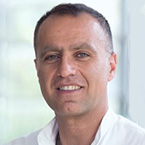Pancreatic Cancer Collective New Therapies Challenge Research Team Grants
The Pancreatic Cancer Collective New Therapies Challenge represents a focused effort to increase the number of innovative and effective therapies to treat pancreatic cancer by support of pre-clinical and clinical development efforts. The Pancreatic Cancer Collective, a strategic collaboration of the Lustgarten Foundation and Stand Up To Cancer, supports collaborative, and multi-disciplinary Teams to investigate novel or repurposed medicines, treatment strategies or technologies that have the potential to significantly impact pancreatic cancer patients in the near term.
Meet the active New Therapies Challenge (NTC) Research Teams
EXPLOITING DNA REPAIR GENE MUTATIONS IN PANCREATIC CANCER NTC RESEARCH TEAM
Research
The Team’s goal is to evaluate DNA repair inhibitors in pancreatic cancer. It seeks to improve PARP inhibitor monotherapy by developing strategies that combines different targeted therapies and have activity in patients with PARP inhibitor resistance. Given that PARP inhibitors are indicated for pancreatic cancer patients who have not progressed on platinum-based chemotherapies, the Team also seeks to develop therapies for patients who have progressed on platinum-containing chemotherapy regimens. The preclinical data from their Round 1-funded efforts showed that combining gemcitabine with inhibitors that target DNA repair proteins may be therapeutically promising. Thus, in their Round 2-funded work, they are embarking on clinical trials on gemcitabine combinations with a) an ATR inhibitor; b) a CHK1 inhibitor, or c) a WEE1 inhibitor.
immunotherapy TARGETING mutant kras ntc research team
Research
Somatic mutations in KRAS underlie oncogenesis in >95% of pancreatic ductal adenocarcinomas (PDAC). The Team is developing T-cell receptor (TCR) adoptive cell therapies to target mutant KRAS (mKRAS). To accomplish this, they are identifying TCR’s of mKRAS-specific T cells from a) healthy individuals; b) cancer patients with mKRAS tumors; and c) mKRAS vaccinated pancreatic cancer patients. Using Round 1 support, they have successfully isolated mKRAS-specific TCRs. In the Round 2-funded project, they will use the most promising TCR in a Phase I adoptive cell therapy clinical trial for patients with metastatic pancreatic cancer.
molecularly targeted radionuclide therapy via integrin aVb6 ntc research team
Research
The integrin αvβ6 is significantly upregulated in different epithelial-derived cancers, including pancreatic ductal adenocarcinoma (PDAC). Members of the Team have previously developed a radiolabeled αvβ6-targeting peptide that they successfully used to image pancreatic cancer metastases. Using Round 1 support, they have developed a novel αvβ6-targeted peptide-based radionuclide therapy. In the Round 2-funded project, they will be testing this peptide in a first-in-human study.
targeting shp2 in pancreatic cancer ntc research team
Research
Ninety-five percent of pancreatic cancer cases contain activating KRAS mutations. Members of the Team have previously shown that SHP2 inhibition can be therapeutically effective in KRAS-mutant tumor cells, under growth factor-limiting conditions. Other work has shown that combining SHP2 inhibition with MEK inhibition has been effective in KRAS amplified gastroesophageal tumors. In their Round 1 work, they explored the therapeutic potential of combining SHP2 and ERK inhibitors in preclinical models of RAS-driven pancreatic cancer. In light of promising findings, they are set to test the SHP2/ERK inhibitor combination in a Phase I/Ib clinical trial in their Round 2 project.









